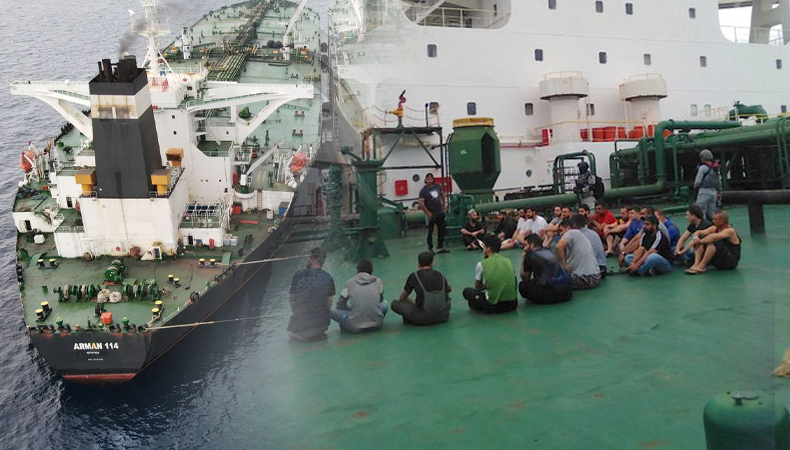Indonesia Seizes Iranian Supertanker Suspected of Illegal Oil Transshipment

An Iranian-flagged supertanker, the MT Arman 114, was recently seized by Indonesia’s coast guard on suspicion of transporting crude oil illegally. The ship was stopped while transferring oil from one tanker to another in the North Natuna Sea. The Indonesian government has committed to increase sea patrols to stop similar operations in the future. This incident emphasises the continuous issue of illegal oil transfers and their effects on the ecosystem.
Also Read – Is Sumatra The Biggest Island In Indonesia? Largest Islands In Indonesia
When the MT Arman 114, a Very Large Crude Carrier (VLCC), was apprehended by Indonesian authorities, it was discovered to be carrying 272,569 metric tons of light crude oil, which had a value of 4.6 trillion rupiah ($304 million). It was claimed that the vessel had transferred oil to another without authorisation. The supertanker was faking its automatic identification system (AIS) to falsely claim to be in the Red Sea while it was actually in the Indonesian seas, according to the maritime security agency of Indonesia.
The Indonesian authorities also learned that the vessel had discharged oil into the ocean violating environmental laws. The MT Arman 114’s operators, as well as those of the MT S Tinos, a ship-to-ship transfer participant sailing under the flag of Cameroon, were not immediately available for comment.
The Egyptian captain, 28 crew members, and three passengers—the family of a security officer on board the MT Arman 114—were all detained by Indonesian authorities in addition to capturing the supertanker. Following the two supertankers’ attempted escape, Indonesian law enforcement concentrated on pursuing the MT Arman 114, with aid from Malaysian law enforcement, once the ship reached their seas. Conversely, it was anticipated that the MT S Tinos would be retired in 2018.
Historical Context and Shadow Fleet
It’s interesting to note that the MT Arman 114 was previously known as the Grace 1, according to data from the shipping database Equasis and the data analytics firm MarineTraffic. When this vessel was apprehended by British Royal Marine commandos in 2019 on suspicion of trying to transfer oil to Syria in violation of EU sanctions, it made headlines. Eventually, following a diplomatic stalemate with the West, the tanker was freed.
This incident shows that a “shadow” fleet is transporting oil from nations under sanctions, such as Iran, Russia, and Venezuela. These tankers travel through the Singapore Strait to avoid detection, raising the possibility of oil spills and accidents. In recent years, the rise of this murky parallel economy has been aided by the influx of additional ships, some of which lack adequate insurance coverage.
Enhanced Maritime Patrols and Deterrence
Indonesian officials, including the coast guard and other pertinent organisations, have promised to increase patrols in their waters in response to the incident. Effective maritime monitoring is essential to reducing criminal operations in the area because Indonesia has the biggest archipelago in the world, with over 17,000 islands. The authorities want to prevent further incidents by taking a more rigid and proactive stance, and they also want to guarantee that maritime laws are being followed.
This is not Indonesia’s first intercepted vessel engaged in comparable activities. Authorities in Indonesia detained Iranian and Panamanian-flagged ships in 2021 on suspicion of smuggling oil. An Indonesian court later gave the captains of these ships a two-year probationary period.
Also Read – Indonesia Seeks Financial Impetus From Saudi Arabia To Relocate Capital For $32 Billion
The Indonesian coast guard’s detention of the Iranian supertanker MT Arman 114 brings attention to the persistent problem of unauthorised oil transshipments and their potential environmental effects. Indonesia has promised to increase marine patrols in its territorial waters to avert further mishaps and serve as a deterrent. The incident also serves as a reminder that a “shadow” fleet exists that is involved in avoiding sanctions through covert oil transfers, increasing the likelihood of oil spills and mishaps. Enhancing surveillance measures and international cooperation are crucial to combat these illegal operations.




